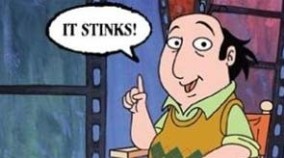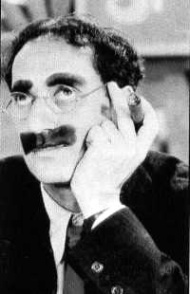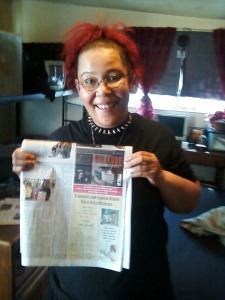“Better to write for yourself and have no public, than to write for the public and have no self.” - Cyril Connolly
I have a lot of respect for people brave enough to post snippets of whatever it is they have to be writing at the time. I have no such intestinal fortitude: I really don't feel like opening myself up to critics before I've reached a certain point in my writing: for a novel, this is generally about a third of the way through, which is the point at which it has gained some momentum. For short stories, I won't share them until they are complete first drafts. There is a reason for this: and that is that publishing of any sort invites critics.
Posting a blog invites critics: there is always the possibility of persons who will post criticism in the comments field. Writing on your damned Facebook page invites critics. Given that writing things for which you have no intention of gaining anything concrete (okay, maybe the thumbs up likes on your Facebook page...) attracts critics, it should come to no surprise to you that as soon as you begin to label anything you write as some category of literature, you'll invite criticism of aforementioned work. You're writing really, really serious thing now. What did you expect? Well... let me tell you something, as much as most of us hate criticism, there are certain types of criticism you should welcome and invite. There are other kinds you should ignore. Which are which?
Ignore Generalized/Personal Criticism by Non-Readers
In separating the chaff from the weed, the first step is one most of us wouldn't even imagine would be necessary: and that is to eliminate the people whose criticism is on the level of Junior High School students out to identify who the Cool Kids are. Another variant on this are people who have decided that you knowing them, in and of itself somehow lessens your capacity. For instance, shortly after I stated that I'd written a novel, an acquaintance posted a sarcastic comment about people who claimed to have a novel in them most likely being constipated. There was nothing wrong with what she said: some people thought it was funny, and she got a few likes on her page. However, you as a writer should ignore criticism that has to do with who you are as a person, and not in any way with what you actually have written. You should categorically ignore criticism by people who haven't read any of your works. The word for this sort of criticism is "irrelevant". Relevant criticism has to do with the content of your work, the effectiveness of publicity for your work, and in general: it revolves around the work itself. It is not personal. What makes personal criticism irrelevant is its basis in a logical fallacy known as a "genetic fallacy". That is where an idea is judged by its source rather than its merit. Such criticism is not relevant.
Pay Attention to Specific Criticism, Especially by Readers
Always pay attention to specific criticism: even when it's by non-readers. For instance, the initial observation about the cover of "The Moon Cried Blood" - which was that it appeared to be the cover for a Young Adult novel - came from non-readers, specifically bookstore owners. That criticism was right-on: as soon as I changed the cover art to something more grown-up I began to sell copies to readers of my previous work, "Solitude". If I was trying to open a new niche as a writer of Y.A. fiction, I may have shrugged and said, "well, that's the audience it is for." But I wasn't trying to, and the inappropriate cover art only made it difficult to sell it to the audience I already have. Criticism by actual readers of any description should be taken even more seriously. I don't care if the only thing they read was the dust cover for your book. The fact that they have read anything is showing that they've put some time and interest in you. You should pay close attention to anything that a person who shows interest has to say until you become well known enough to have a staff of assistants - then, have them pay close attention. If your readers have an issue with spelling, typesetting, continuity, grammar... anything that can be qualified specifically so that change is possible - consider what they have to say, and consider if you need to change what you've done accordingly. I don't just mean people who paid for your work, I mean anyone who happens to have taken the time out to read it. Readers are a valuable resource. If you have any readers you are a lucky B, regardless of whether or not those readers are fans. Treasure them.




